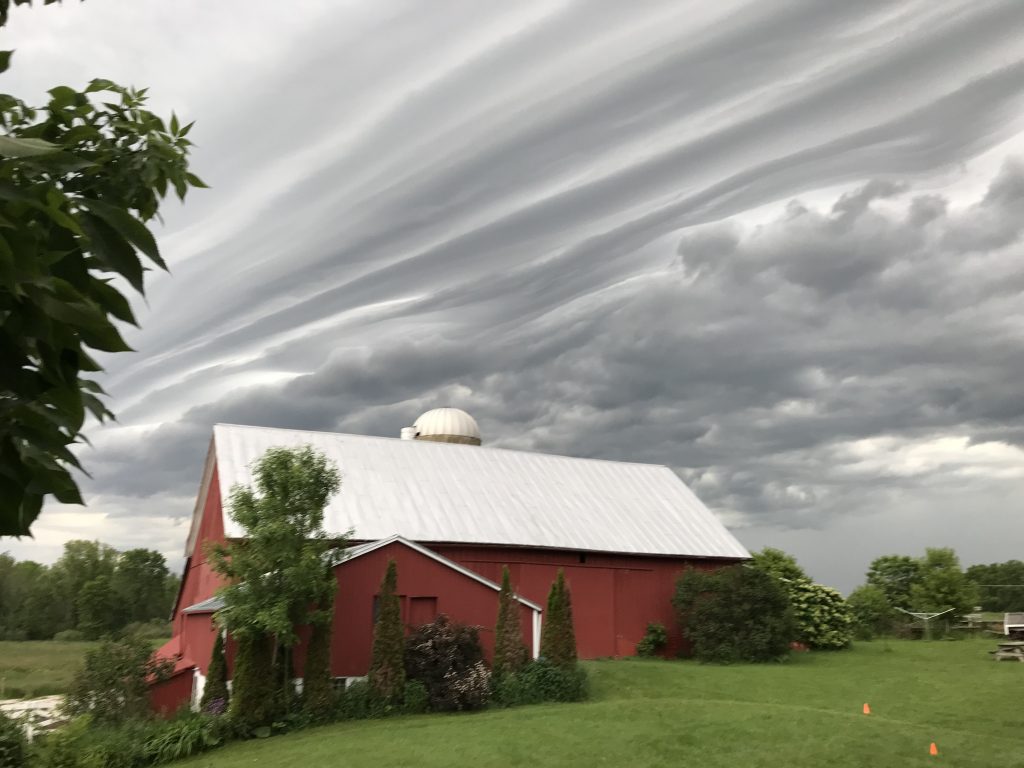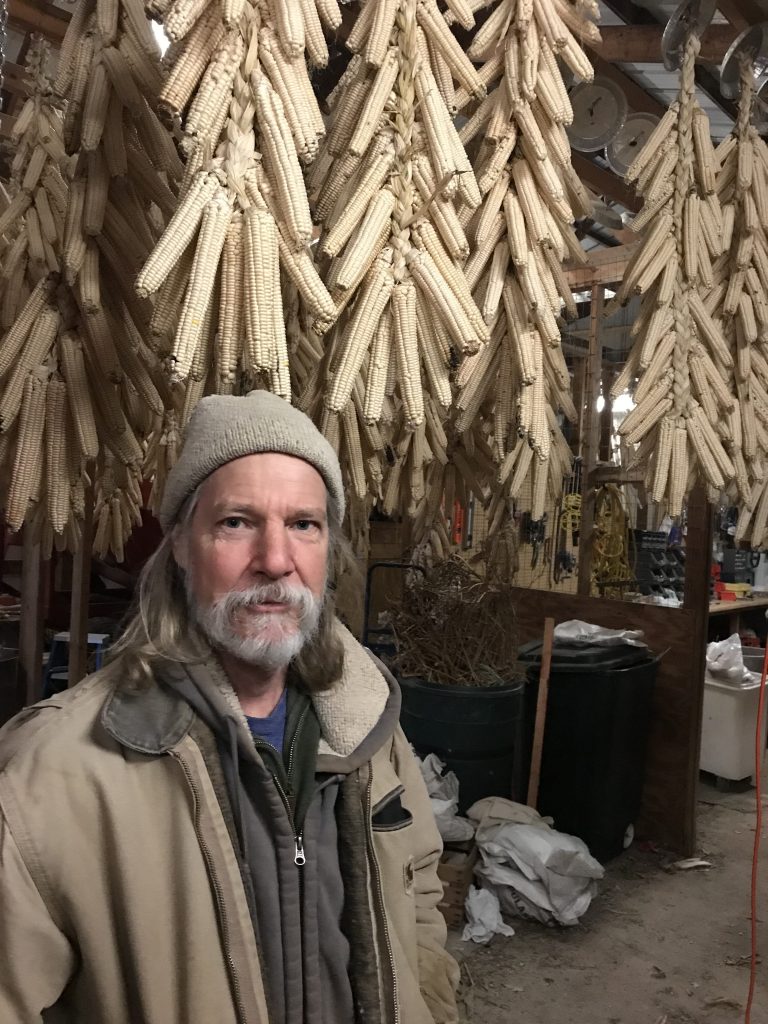Guardians of the Field Farm in Kewaunee County, Wisconsin, is 150 acres of more than 100 species of clover, alfalfa and prairie grasses—some species that even specialists haven’t been able to identify! Not to mention a herd of between 50 and 70 short horned cattle. Lynn and Nancy Utesch are the guardians, having taught themselves rotational grazing for grass-fed beef on their first farm on Washington Island in Lake Michigan before settling in Kewaunee sixteen years ago. That means they’ve been doing this thing—rotational grazing—that’s all the rage right now for more than 25 years! In that time, they’ve used no chemicals, no fertilizers and no pesticides. And they have brought their soil and their farm back to life. “This area has heavy clay. But if you look at our soil, you’ll see the top eight inches is now a deep loamy soil. You can see the difference,” says Lynn.

Lynn and Nancy Utesch
“With our grazing system, we’re trying to replicate the buffalo herds on the Great Plains. We move the cattle on a daily basis. For climate change, this is one of the best things you can do,” explains Lynn. “The action of these grazing animals has the greatest potential to sequester carbon. With proper management, we can put the carbon back where it belongs: in the soil.” Another benefit of grazing, putting the joy back in farming. “Industrial agriculture has made it seem like farming has to be a drudgery; it doesn’t. You can put animals into their natural environment, and you can enjoy life,” Lynn exalts. “By grazing, it allows you to have time to spend with your family.”
Lynn’s beef is direct marketed to about 80 families who come to the farm to make their purchases. “They do that by choice; they want to see where their food comes from,” Lynn says. “If you are willing to open up your farm, they come! And they’re our family. We need to give them the healthiest, most nutritious food we can provide.”
The cattle are processed nearby at Otto’s Meats, a certified organic butcher shop. “Our animals are born here and raised here—there’s just one day that they travel, and that’s only 10 miles away,” says Lynn. “Otto is a careful butcher, trained in the traditional ways. The life—and humane slaughter—of our livestock is very important to us and our customers.” Lynn raises short horns, like his uncle before him who raised them beginning back in the 1930s and who was the first president of FFA in Wisconsin. Short horns have good meat quality, they are good on grass, and they’re self-sufficient. In other words, they fit the farm to a T. “We thank each animal for what they provide us,” Lynn says.
“Industrial agriculture has made it seem like farming has to be a drudgery; it doesn’t. You can put animals into their natural environment, and you can enjoy life.”
Lynn and Nancy raised five children on the farm, none of whom are currently farming, and that’s just fine with Lynn. “I want them to go out and experience the world. If they come back, it’s because farming is truly what they want to do.” Lynn has sought ways to pass his knowledge on, particularly through his work at the Oneida Nation. He has volunteered for fifteen years at Tsyunhehkwa (pronounced Joon-heh-kwa and meaning “life sustenance” in Oneida), a 53-acre certified organic farm on the Oneida Nation near Green Bay. Lynn started by sharing his expertise in fencing and cattle-rearing, and with his youngest child now in high school, he recently found the time to start a regular job there.
“In conventional agriculture, you don’t have a lot of opportunity to pass knowledge on, except in a generational way. Here, I can work with young people,” he says. “I want new farmers to have the ability to ask me questions—to not have to make the same mistakes I made.” In addition to passing on his know-how, Lynn has found in the Oneida the same passion and drive to take care of the soil and water. “The Oneida people believe that water is life,” he explains. “It is so nice to not have to explain why we do things to protect the water, land and air. It is a joy to come to work each day.”
Lynn, too, believes water is life, and the water pollution he witnessed in his community inspired him to act. Kewaunee County has sixteen CAFOs (confined animal feeding operations), giving the county a population of 100,000 cows, which dwarfs the human population of 22,500. The incredible volume of manure generated by so many animals is dealt with via immense manure lagoons and the spreading and spraying of manure on farm fields. This is an especially delicate process on the shores of the Great Lakes and in an area known for its unique karst landscape. Karst is a special type of geology formed by the dissolution of soluble rocks, including limestone and dolomite. On the plus side, Karst regions contain aquifers that can provide large supplies of water. On the other hand, Karst landscapes are extremely susceptible to groundwater contamination.

Lynn Utesch’s farm.
In Kewaunee County, all three of the county’s rivers are impaired and 30% of the county’s wells have been deemed unsafe to drink. The issue reached a crisis point in 2004 when a local family’s infant was hospitalized with life-threatening e. coli poisoning. “It got to the point where we couldn’t just keep saying, ‘Somebody should do something about that,” Lynn explains. “We realized eventually we were the people.” So Lynn and Nancy established Kewaunee Citizens Advocating Responsible Environmental Stewardship, or Kewaunee CARES, in 2011.
“Farmers are good people. You look out for the land, your animals, your neighbors. But these are not the principles being applied to these CAFOs,” Lynn says. In fact, Lynn explains, the Wisconsin state regulations allow manure pits to leak 500 gallons of manure per acre per day. The members of Kewaunee CARES conduct regular water testing, checking levels of phosphorous, nitrates and e. coli; they attend hearings to challenge CAFO permits through legal means and to call for the state to do its job to protect the water; and they use science to show the consequences of this kind of consolidation in animal agriculture, partnering on studies with Marquette University and Johns Hopkins.
Lynn says, “This is not just an environmental issue. This is a human health issue.” He notes, “We are not anti-agriculture; a lot of people who fight for clean water are, in fact, farmers! This is not a battle being fought by urban people; it’s local people who live here. We care about our homes and our communities. The government—and the regulations—are not going their job.”
The goal of Kewaunee CARES is good farm policy that supports true family farm agriculture. Lynn suggests, “Let’s get back to farming like my grandparents did. We can have new technologies and efficiency, but we don’t need to work against clean water and air and the economies of rural communities.”

Lynn and Oneida white corn at Tsyunhehkwa.
Local control is a basis for the work of Kewaunee Cares—the idea that communities should have a say in what happens in their own backyards. It was a platform Lynn ran on in 2016 when he ran for District 1 of the Wisconsin State Assembly. Lynn explains, “I ran because nobody was representing me; elected officials are not representing us. We want clean water, air and food. These are basic human rights.” While he didn’t win his race, Lynn was pleased to create awareness of the issue of water pollution, in Kewaunee County and across the state. He says, “I lost, but I won. All those issues have become mainstream issues.”
Lynn has seen a lot of change in the food system—change that gives him hope. “I used to have to explain why someone should buy local food, or why someone should buy grass-fed beef. In the last few years, I’ve seen that consumers have become more educated.” He credits young mothers with leading the way. “Young mothers are changing the world,” he says. “They’re demanding for their children a cleaner, healthier product.” He’s excited too by the number of “young people who approach me and ask how they can get involved in agriculture.” In fact, during our phone interview, we were (happily) interrupted three times when young people stopped by the farm at Tsyunhehkwa to ask about how they could get involved. Their concerns and interests include healthy eating and mitigating climate change. Lynn predicts, “Our food system is going to change. It may not be tomorrow, but it will happen dramatically and overnight. The commodity system is failing us… everyone knows that.”
This Farmer Hero long ago found his market outside the commodity system, putting down deep roots to capture carbon and feed his cattle the way nature intended. In the time that he might have spent hauling feed and manure in a conventional system, he shares his knowledge and passion with the next generation of farmers and fights for regulation so that clean water is something we all have, in this generation and the next ones.
Lynn Utesch and Kewaunee CARES are featured in Right to Harm, a new documentary film that exposes the devastating public health impact factory farming has on many disadvantaged citizens throughout the United States. Filmed across the country, the documentary chronicles the failures of state agencies to regulate industrial animal agriculture and the hard work of citizens band together to demand justice from their legislators.




